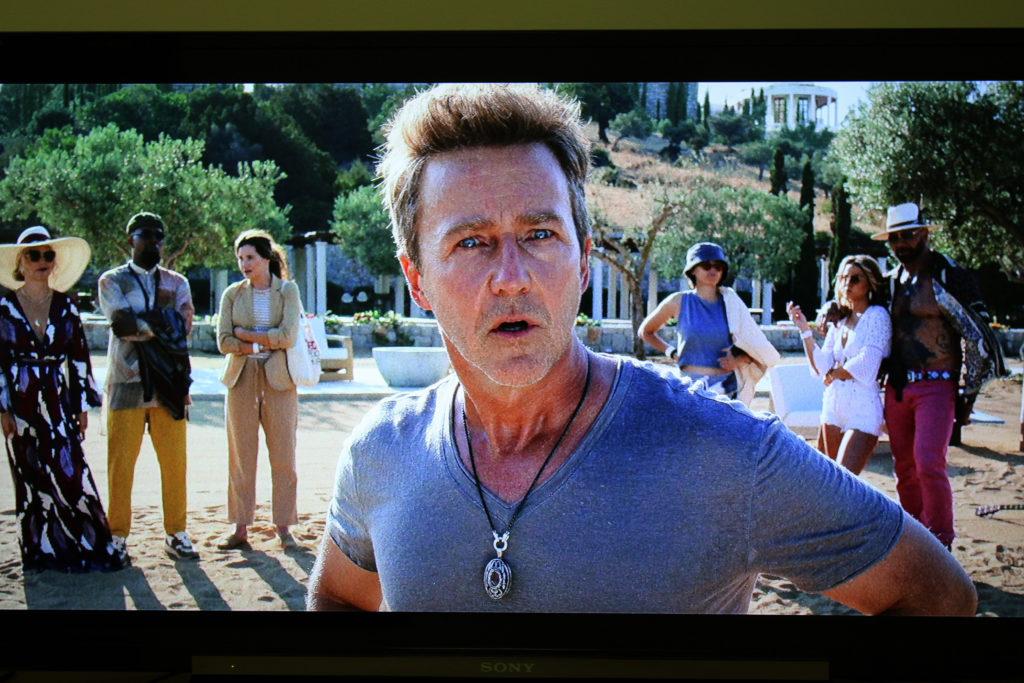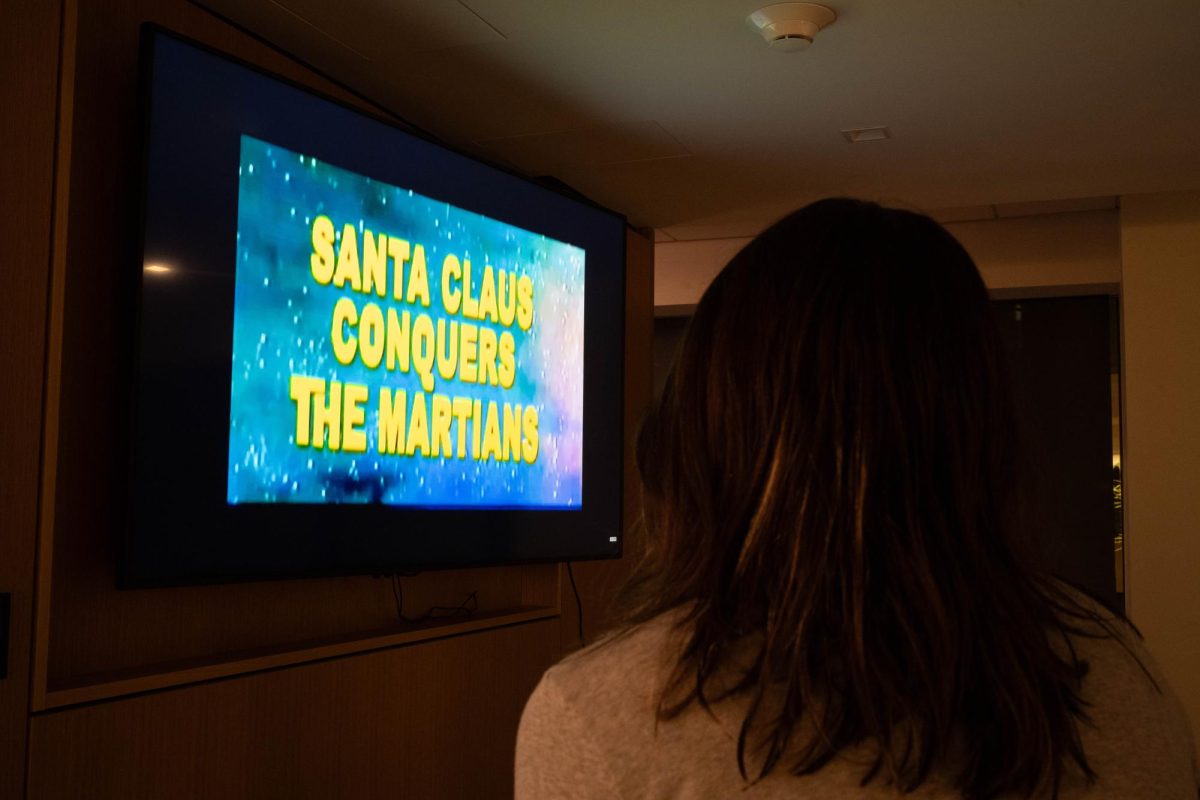As the highly anticipated sequel to murder mystery “Knives Out,” the star-studded whodunit “Glass Onion” delivers a twisty mystery that lives up to half its title – expertly layered but never translucent.
Director Rian Johnson presents a series of deadly riddles that serve as a cunning commentary on wealth and power to piece together a cinematic puzzle consisting of class privilege and the “American dream” in true “Knives Out” fashion. Lively filmmaking and strategic editing, which leaps between arguments and plot twists, match the quick pace of the picture as part of a sly and humorous display of this dramatic thriller.
“Glass Onion” comes as the first of two Netflix sequels to “Knives Out,” featuring a completely new slate of cast members save Benoit Blanc (Daniel Craig), the whimsical and witty gentleman sleuth who solved the “doughnut hole” murder mystery in the original. The movie came out last week in limited theaters and will release on Netflix in late December.
A private Greek island owned by Miles Bron (Edward Norton), an Elon Musk-esque tech billionaire, anchors the action of the film. Like any whodunit, the plot revolves around a core of Bron’s caricature-like friends whom he invites to his island, including the liberal wine mom governor of Connecticut (Kathryn Hahn), the “men’s rights” gaming streamer (Dave Bautista), the former model under constant media scrutiny (Kate Hudson) and the scientist on the verge of a major breakthrough (Leslie Odom Jr.). The oddballs are all members of a troupe that calls itself “The Disruptors,” hinting toward their desire to interrupt society through their own professions.
Blanc’s appearance is curious in and of itself – he didn’t know Bron before he received the invitation, and his arrival comes as a surprise to every other guest. The introduction of Cassandra “Andi” Brand (Janelle Monáe), Bron’s former business partner who was booted from their company in a controversial business move, catalyzes drama between guests.
With arguments spurring and drinks being poured, tensions begin to rise when irregular Google alert pings and slamming door thuds build a sense of tension and unease around the oblivious characters as the music stiffens and the camera shots tighten. With the mounting suspense, it’s not long before someone on the island turns up dead.
While most movies released over the past few years work to ignore COVID-19 at any cost, “Glass Onion” is an unapologetic period piece set during the height of the pandemic in 2020. Instead of corsets or historical dresses, face masks are the film’s period clothing. Between dreaded Zoom meetings, gubernatorial TV interviews from the living room and Among Us games from the bathtub, the movie’s portrayal of the boredom of May 2020 ushers in the much-needed getaway weekend in Greece.
The film takes full advantage of its location on the breezy Greek island (just look as far as Craig’s killer blue and white striped poolside outfit) – bright blue skies and warm settings establish the perfect location for the contrast of a dark murder. Johnson’s care for detail in his directing shines through in this movie with tactics like a mimicking of classic celluloid film in one of the most beautiful films I’ve seen in a theater. The movie’s at-times suspenseful and at-times bubbly score, supplemented with Beatles and Bee Gees and David Bowie songs, feeds into the senses of doom and cheer defining the film.
Johnson set the bar high with “Knives Out” with solid performances from Ana de Armas, Chris Evans and Daniel Craig as part of a witty midbudget film genre that has otherwise failed at the box office since the proliferation of the franchise megablockbuster. The subversion of the detective genre, typically marked by worn-out cliches and tropes of the centuries-old genre, is crucial in “Glass Onion.”
Rest assured, you will leave the theater having watched a vastly different movie than expected.
A set of brilliant lead performances from Norton, Craig and Monáe drives the movie forward. Craig’s priceless “Kentucky-fried Foghorn Leghorn drawl” crowns him the master of the one-liner – “You vainglorious buffoon!”, “You dimwitted, brainless, jackass!”, “I am not Batman” – and his poise and intelligence are central to the film.
Monáe walks away the big winner performance-wise – her wildly dynamic portrayal of Andi ties the film’s mysteries together in more ways than one, and she juggles the challenging role with ease. Monáe adeptly tunes into a sense of revenge – not just toward Bron, who kicked her from their company, but toward her former friends who doubted her character and betrayed her during a very-public trial regarding her role in the company.
The movie is obviously not perfect. The surrounding cast of characters feels shallow — their backstories needed to be fleshed out further and the social power dynamics within the group were, at times, unclear. After “Knives Out” — when the interactions and tension between family members was instantly understandable and, to a certain extent, relatable — a group of secondary characters with unclear motives and interactions was disappointing.
Much like the first film of the series, “Glass Onion” is a pointed critique of the vapid culture of the über-rich. Bron awkwardly name-drops real-life celebrities he’s befriended, sharing Jared Leto’s kombucha and Jeremy Renner’s hot sauce with his guests. Bron obsesses over the Mona Lisa – he rents the art for his home while the Louvre is closed for COVID while praying that his life’s work will be comparable to the fame the artwork has earned. Even Bron’s guests admit to disliking Bron, simply pandering to keep suckling his economic teat.
The film gains thematic relevance as Elon Musk gains cultural relevance – in fact, it feels nearly prophetic. Bron works hard to maintain an aura of intelligence and prestige while touting products potentially failing expectations. But in reality, he’s a dunce simply profiting from well-timed maneuvers and claiming the intellect of others.
It’s those dynamics – monied interests versus the opportunistic, those with nothing to lose versus those with everything to lose – that keep the engine of the film running. The theme isn’t a radical one, but “Glass Onion” builds off the momentum of “Knives Out” to spin an entertaining tale.






![The [insert here] improv group asks for volunteers during a skit.](https://gwhatchet.com/wp-content/uploads/2025/02/Slate_2_8_25_KW-1-1200x800.jpg)

